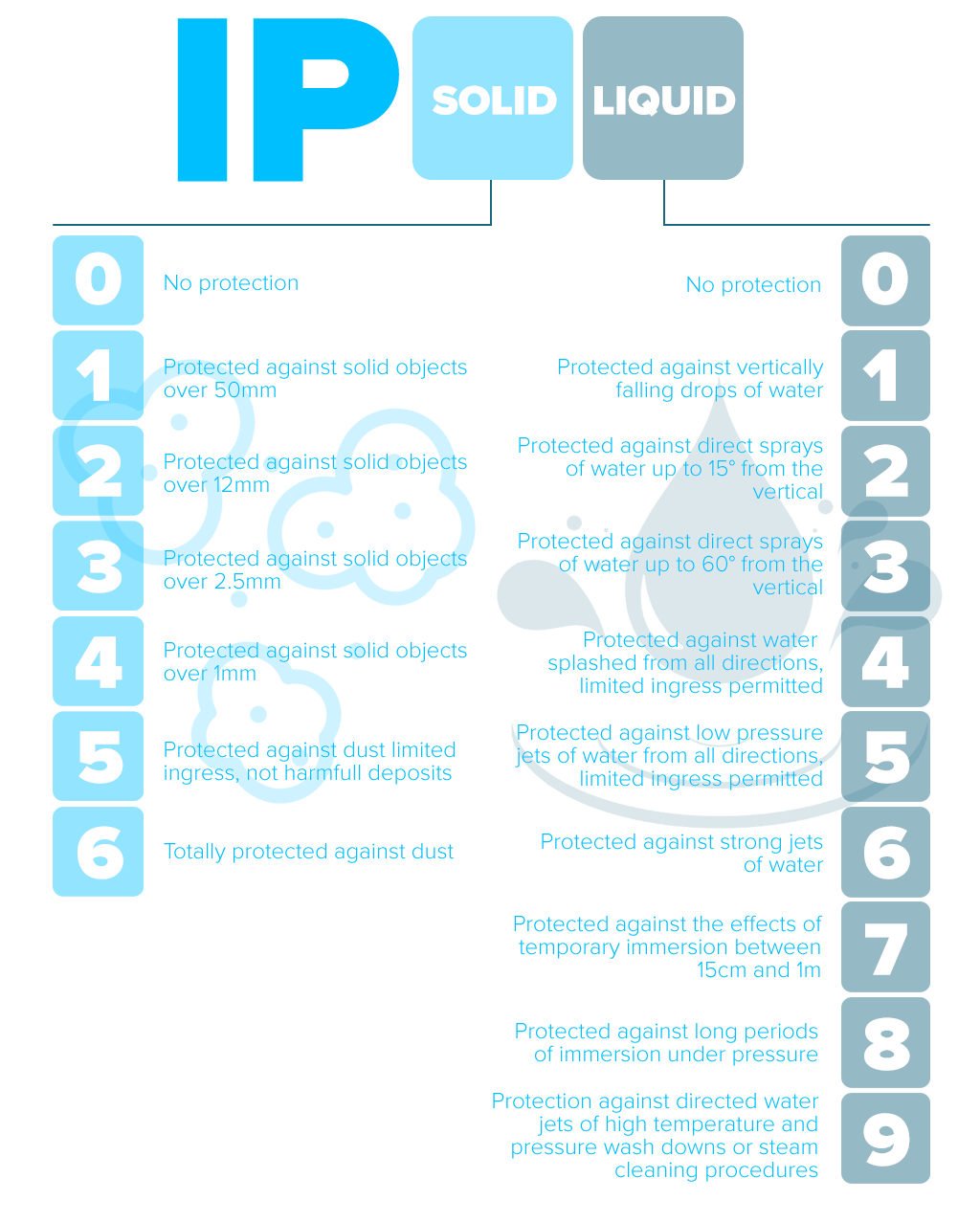IP rating chart
Understanding an appliance’s IP rating and how these figures are derived is essential in ensuring the right bit of kit is installed in challenging locations.
So what is IP rating? It’s a ‘score’ that can tell you easily and quickly how resistant to moisture or to solid foreign bodies like dust any electrical item is – and thus how durable it is. And from our IP rating chart here you’ll be able to see how the double-numeric rating is calculated.
That means when you look at an equipment specification, you’ll be able to understand what IP rating is recommended – and why.
What does IP stand for
Often IP relates to Internet Protocol, as in ‘IP address’ but in the case of IP ratings, IP stands for ingress protection. It’s vitally important for a reliable and safe installation to have kit with the right ingress protection rating. By doing so you’ll ensure any installation is not affected by the weather, pressure cleaning or any other abuse it may suffer.
Rather than ask what does IP stand for, ask why do I need to know? Read through this page and we’ll explain why an IP rating is important for users’ safety.
IPX rating
In certain interior installations – like bathrooms or indoor pools – IP zones can be specified. That means that anything in a certain area must be rated to a certain IP due to the risk of water splashes or water jets getting in the equipment, potentially harming it and making it unsafe.
Likewise, when IPX ratings are specified, that means there is no solids protection required as the equipment is designed to be inherently waterproof (often very waterproof.) So were you compare ipx 5 with ipx 7, then the former only protects against water jets ‘propelled by a nozzle’ (by that we infer a jetwasher) whereas the latter can be immersed in water up to 1m deep for up to 30 mins with no issues.
IP Ratings explained
Basically the higher the IP ratings, the better protected electrical equipment will be and the safer users will be too. So as you can see from our IP ratings explained chart, something with an IP rating of IP65 will not offer as much protection as IP66.
When understanding an IP rating, the first number is how resistant the kit is to the ingress of solids and the second relates to moisture. Essentially what IP rating is recommended can be discerned by considering that the higher both the numbers are, the more protection there will be – but inevitably, more protection often means more expense. So you need to weigh up the benefits (both safety and reliability) vs the costs.

Waterproof rating
When dealing with waterproof rating, it’s important to understand what is available and what is needed to ensure safety. Potentially any electrical item can be unsafe if water or dust is allowed to get inside.
So what IP rating is waterproof? All of them from 1 to 9! It just depends on the level of protection you need – which you can trust us to specify.
Most equipment we supply and install for outside or in areas likely to be immersed in water is rated to IP65, IP66 or IP67. As you’ll see from our chart, these IP waterproof ratings offer variable levels of water protection.
Dust protection for AV equipment
You don’t think of dust and particles getting into equipment would present as much risk as water – but often it does.
In certain environments – near beaches or in garden centres to name just two examples – dust protection is important.
Therefore, we will specify IP65, IP66 or IP67 equipment depending on the application and estimated use.
What IP rating do I need?
For AV equipment outdoors, there are three main IP ratings that should be considered:
- IP65: For speakers or TVs that are outside in sheltered areas and will not be in danger of getting jet-washed or rained on constantly.
- IP66: For equipment that is liable to be splashed or jet-washed or subject to heavy seas. Considering
- IP65 vs IP66: Greater protection against high pressure water ingress.
- IP67: The ultimate rating for equipment we install and supply. For kit that may be temporarily immersed in water as well as any other water sprays or splashes.
- IP66 vs IP67: Greater protection and possibility of immersion in water
IP rated TV
We can supply and install a variety of IP rated TV systems suitable for many challenging installations in all the areas of business we service. We can install TVs and speakers in locations such as:
- Beach bars – you have to think of what the weather and sea spray will do to them in the winter, as well as the sand which gets everywhere.
- Pub beer gardens – it’s mostly about protection from the UK weather, whether that is excessive heat in the summer or the inevitable rain.
- Leisure centres – depending on how close the swimming pool is can determine whether excessive condensation is a consideration here.
… and many other challenging environments. For more info and application ideas, go to our outdoor TV page.
IP rated speakers
Like TVs above, IP rated speakers can often be placed in very exposed situations not only outside, but in indoor areas of high humidity. Additionally, many specifiers like to hide outdoor speakers and lights in greenery, often with water dripping onto them as a result. Particularly challenging installations we’ve been involved with included:
- Public swimming pools – indoors and outdoors.
- Sports stadia (anywhere from the players’ showers to the main PA.)
- Health clubs and spas
IP rated enclosure
A lower cost alternative to outdoor-specific TVs is the IP rated enclosure system shown in detail on our outdoor TV page.
These innovative enclosures have two main functions:
- They are IP rated so can protect a regular domestic TV from the elements whilst still allowing good viewability and functionality.
- Because they’re robust lockable enclosures with a tough Lexan screen, they are useful for mounting TVs in high-risk areas such as pub beer gardens or public areas like transport hubs or stations.
IP rated sockets
When we install AV equipment outside – whether sheltered or exposed – we always ensure that the mains wiring used is up to spec and uses IP rated sockets. Most are rated IP66 to ensure the weather doesn’t get to them either with or without appliances plugged in.
Any IP-rated exterior system is only going to be as strong as its weakest link and therefore we go to great lengths to ensure that any installation we undertake is as safe as possible and has all components rated similarly and appropriately for the environment.
Request a quote
Get in touch with our friendly team using our handy contact form below...


